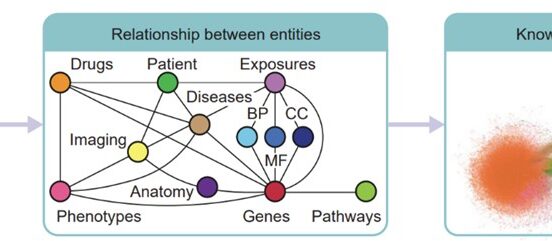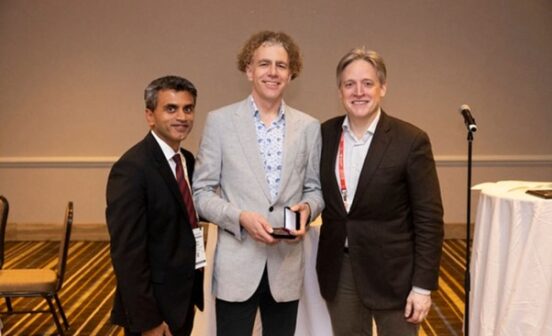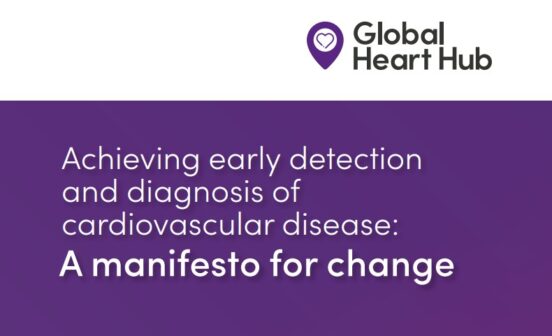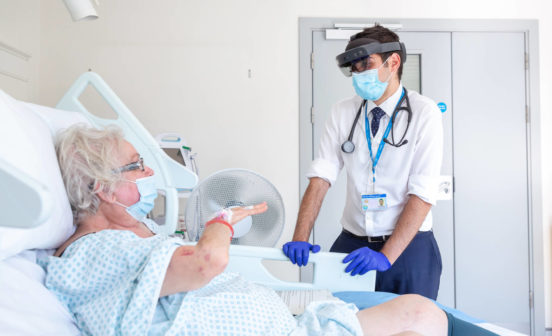Our Theme aims to revolutionise the management of cardiovascular disease (CVD) by optimising personalised healthcare approaches to prevent, monitor and treat cardiovascular complications in our patients. We work very closed with the Imperial British Heart Foundation Centre for Excellence.
Why this Research is Needed
CVD causes a quarter of all deaths in the UK, equating to one death every three minutes. Over 7.5 million people in the UK live with CVD. In our local community of 2.3 million in north west London, around 170,000 people have CVD and 280 die every month. Our research is driven by the high burden of CVD in our community and seeks to identify new treatments and technologies that will improve our patients’ quality of life and longevity.
Theme Aims
Our theme focuses on three strategic aims that will ultimately transform the outlook for our local patients, as well as inform global practice:
- Use novel hospital and laboratory tools to enhance cardiovascular risk stratification
- Employ innovative point-of-care and remote monitoring tools to identify patients at risk and facilitate early medical intervention
- Identify and test new treatments.
Detailed Theme objectives can be found here.
Upcoming /Ongoing Projects within the Theme
To deliver our aims, we will use sophisticated artificial intelligence-based computational methods to integrate genetic and genomic analysis of DNA, blood and tissue biopsies with clinical diagnostic measurements collected from our patients. Our involvement in strategic NIHR partnerships including the NIHR-British Heart Foundation Cardiovascular Partnership and the NIHR-Health Informatics Collaborative will facilitate access to a wider range of clinical data to define and validate signatures of specific disease states. We will also leverage data from large Imperial-managed studies and clinical trials such as TRICODER, a cluster-randomised-controlled trial in 300 GP practices evaluating a point-of-care diagnostic for heart failure; LOLIPOP, which collects health records from 30,000 people living in west London since 2002; AIRWAVE, an epidemiological study of British police officers and staff with more than 50,000 participants; and our ORBITA series of clinical trials that assess how interventional procedures and smart devices may benefit cardiovascular outcomes.
Below are some of the conditions we study:
- Atherosclerosis and coronary artery disease: Atherosclerosis is the buildup of fat in the arteries that supply blood to the heart. Over time, these fatty deposits (known as plaque) result in narrowed or blocked arteries and may cause serious complications, such as coronary artery disease and heart attacks.
- Heart attack and heart failure: Our team’s expertise spans both acute conditions such as heart attacks, as well as chronic conditions that affect the blood vessels of the heart and the heart’s tissue such as coronary artery disease, pulmonary hypertension and cardiomyopathies, a general term for diseases of the heart muscle.
- Haematological and immune-mediated disorders: Haematological diseases such as von Willebrand disease and immune-mediated disorders including autoimmune disease and long–COVID, are associated with vascular complications. Our team seeks to better characterise the biological processes that cause these complications in our patients to provide better healthcare for complex multiple long-term conditions (multi-morbidity).
Pilot Projects
Following an open call in the summer of 2023 the following pilot projects were funded from the Theme:
- Phenotyping early dilated cardiomyopathy: A Step towards precision therapy – Dr Brian Halliday
- Association between sex hormone profile and ventricular hypertrophy and myocardial fibrosis in patients with hypertrophic cardiomyopathy – Dr Paz Tayal
- The role of neutrophil biomechanics and activation status in driving diseases progression in PAH – Dr Andrew Cowburn
- Mapping gene expression in dilated cardiomyopathy – Dr Michela Noseda
- Using iPSC-derived endothelial cells as a tool to investigate the role of mutations in the transcription factor ERD as a novel genetic cause of primary lymphoedema – Dr Graeme Birdsey
- Implementation of a novel software algorithm on to a custom recording system for rapid mapping of atrial fibrillation to guide ablation therapy – Dr Prapa Kanagaratnam
- Remote monitoring to inform digital twin for pulmonary hypertension pilot (REMIT-PH-pilot) – Prof Martin Wilkins
- Screening atrial fibrillation patients awaiting ablation remotely and innovatively for obstructive sleep apnoea: an observational cohort study using the AcuPebble – Dr Patrik Bachtiger
Fellowships
- Beyond Scar: targeting of heterogeneous ion channel and gap-junction abnormalities as an ablation strategy Rasheda Chowdhury
Co-funded with the Imperial BHF CRE
- The All of Us dataset at the Broad Institute of MIT and Harvard: The rate of positive reports in carrier screening and rare variants of takotsubo cardiomyopathy Kathryn McGurk
- Investigating the use of personal remote monitoring data to monitor risk of clinical worsening and clinical course of patients with pulmonary hypertension Niamh Errington
- Linking molecular changes to whole organ function in diabetes mellitus patients Marina Strocchi
- Genomics of Cardiomyopathy Sean Zheng
- The role of IL-6 family cytokines in the pathophysiology of hypertrophic cardiomyopathy Mark Sweeney
- TRICORDER-PLUS Mihir Kelshiker
- Advancing the definition, diagnosis, and treatment of angina Michael Foley
Co-funded with the MLTC Theme
- The gut-kidney-heart axis as a driver of cardiovascular disease progression Petros Andrikopoulos
- Microbial catecholamine metabolism in human metabolic and cardiovascular health Kanta Chechi
Patient and Public Involvement, Engagement and Participation
Our patients and their carers are at the heart of our vision. Our Community Partners focus group, made up of six members of our local west London community, will help guide our theme’s strategy and shape the next steps of our research. We also work with established patient and public panels within the Imperial NIHR-BRC and the BRC Patient Experience Research Centre to encourage engagement and participation to optimise personalised healthcare.
The Imperial Communications Department helps disseminate our research outputs and policy influencing practices to the public. For example, our team members recently co-produced a report highlighting challenges and ways to future-proof health research in the UK. We also support cardiovascular-focused educational activities for the public – this year, we are involved in the third Annual Imperial Science in Medicine School Teams Prize (2023) for sixth form students in the UK.
Equality, Diversity and Inclusion
Equality, diversity and inclusion principles are embedded in our research strategy. We focus on providing personalised cardiovascular healthcare to our local ethnic and socio-economically diverse west London community, but anticipate our findings to impact patient care nationally and internationally. Our patients are involved in both shaping and delivering our research through participation in focus groups, consenting to health records access and donating biological samples for our studies, as well as recruitment in our clinical trials. Crucially, we also engage with local GP surgeries to reach our entire west London community. Our research is directly linked with the Imperial Health Knowledge Bank and the Imperial NIHR-BRC digital health theme that monitors research participation by age, ethnicity, gender, deprivation and disability.
Our Community Partners
In accordance with the Imperial BRC’s PPIEP Strategy , our theme has recruited a group of Community Partners to act as critical friends to our theme and share their valuable lived experience with our researchers and health professionals to help improve the relevance and quality of our research for the benefit of our North West London population.
Key Individuals
-
Dr Rasha Al-Lamee
Clinical Reader in Cardiovascular Science - Co-Theme Lead -
Professor James Ware
Professor of Cardiovascular & Genomic Medicine - Co-Theme Lead -
Dr Arunashis Sau
Academic Clinical Lecturer National Heart & Lung Institute -
Dr Charis Pericleous
Research Fellow - Cardiovascular Theme Committee Member -
Dr Christopher Rhodes
Senior Lecturer in Pulmonary Vascular Disease - Cardiovascular Theme Committee Member -
Dr Daniel Keene
Clinical Senior Lecturer in Cardiology -
Dr Declan O'Regan
Honorary Reader & Consultant Radiologist -
Dr Fu Siong Ng
Clinical Senior Lecturer in Cardiac Electrophysiology -
Dr Graham Cole
Honorary Clinical Senior Lecturer - Cardiovascular Theme Committee Member -
Dr Luke Howard
Consultant Pulmonologist -
Dr Prapa Kanagaratnam
Consultant Cardiologist -
Dr Ramzi Khamis
Clinical Research Fellow/Consultant Cardiologist -
Dr Zachary Whinnett
Clinical Senior Lecturer in Cardiac Electrophysiology / Consultant Cardiologist - Cardiovascular Theme Committee Member -
Professor Anna Randi
Professor of Cardiovascular Medicine - Cardiovascular Theme Committee Member -
Professor Costanza Emanueli
Chair in Cardiovascular Science -
Professor Danilo Mandic
Professor of Signal Processing -
Professor Darrel Francis
Professor of Cardiology -
Professor Jamil Mayet
Consultant Cardiologist - Cardiovascular Theme Committee Member -
Professor Jane Mitchell
Professor of Pharmacology in Critical Care Medicine - Cardiovascular Theme Committee Member -
Professor Jaspal Kooner
Professor of Clinical Cardiology -
Professor Martin Wilkins
Vice Dean (Research) Faculty of Medicine -
Professor Nicholas Peters
Professor of Cardiac Electrophysiology - Cardiovascular Theme Committee Member -
Professor Peter Sever
Professor of Clinical Pharmacology & Therapeutics -
Professor Stuart Cook
Professor of Clinical & Molecular Cardiology
































